140 Search Results for schedules
November 20, 2012
by Robin Parker -
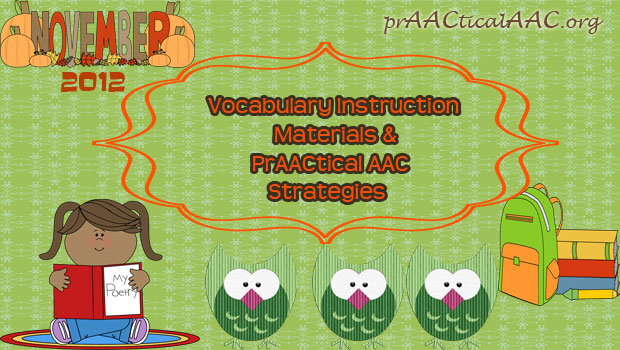
We are super big fans of Teachers Pay Teachers (TPT). We need the PrAACtical resources that TPT offers. In addition to paying ridiculously low prices for some great teaching materials and cool classroom resources, there are also many free options. Check out these free vocabulary resources and have lots of fun. As always, the materials are only as good as the teaching strategies that go with them. As we check out these awesome vocabulary resources, we will use the following guiding principles and we will create appropriate communication opportunities for ALL learners to participate in direct vocabulary instruction. Active Participation for Everyone– Make sure all learners can make choices within the activity, respond to questions, add information, request clarification, and even ask for a break if they need it. To do this we will need one hit message devices, visual supports, individual and group communication displays, choice boards, switches, etc.... [Read More...]
November 10, 2012
by Robin Parker -
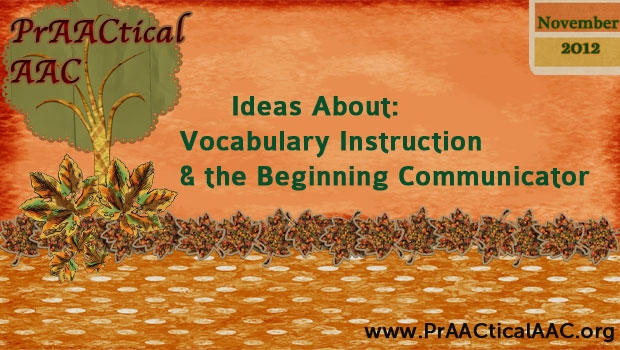
Vocabulary instruction is a topic not often discussed for beginning communicators. As we work with beginning communicators the primary focus is often vocabulary selection for communication displays. This is understandable as the beginning communicator has many needs, but that is no excuse for leaving out vocabulary instruction. Direct vocabulary instruction helps expand broader vocabulary selection options, literacy skills, and world knowledge. With that in mind, see below for vocabulary instruction philosophies, notes, and activities for the beginning communicator. Please let us know about your favorite vocabulary instruction activities. Vocabulary Instruction for the Beginning Communicator: 5 Philosophies Vocabulary instruction involves a systematic TEACHING process. Add vocabulary as an activity on the daily schedule and then have a mini-schedule for the specific vocabulary instruction activities for that day. Carole introduced general steps for vocabulary instruction last week. For the beginning communicator, also apply an errorless learning paradigm. Gradually, add comprehension checks, but... [Read More...]
October 30, 2012
by Carole Zangari -
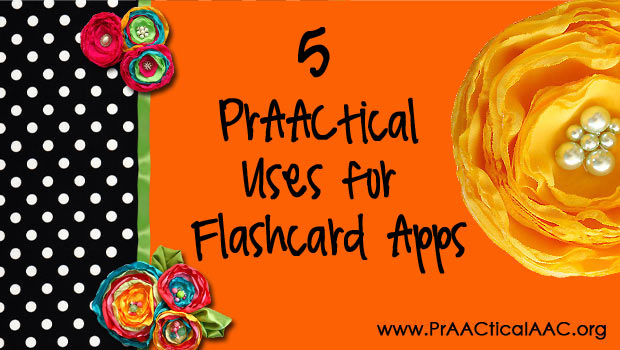
We love AAC intervention that begins and ends with a context that is meaningful to the learner. Not only is contextually relevant therapy more engaging and fun for the learner (thus, easier on the clinician!) but it promotes generalization to real-world contexts. So we’ve never been terribly fond of therapy that uses flash cards, or, more recently, the digital versions on iOS or Android devices. It’s a shame, really. There are a lot of those kinds of apps, and many of them have great graphics. That got us to starting thinking: What could we use them for that improves real communication and AAC learning? PrAACtical Uses for Flashcard Apps Make a Mini Schedule: Lots of people with AAC needs use paper-based picture schedules that depict the activities they do throughout the day. A flashcard app could be used in conjunction with those to show the steps or parts of an... [Read More...]
October 20, 2012
by Carole Zangari -
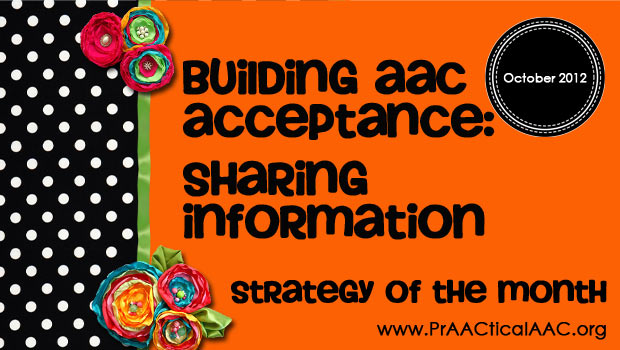
While there are certainly attitudinal barriers to AAC, it’s also true that sometimes the people we are trying to influence just need more information. Sounds simple, right? Not exactly. Especially when we consider these factors. Adult learners prefer to chart their own course to learning new things rather than have others lay that out for them. Our behaviors are most likely to change when we discover solutions for ourselves, as opposed to following directions that others give to us. We have a limited amount of time to guide others to the information they need. Here are some things that have worked for us. Develop a bank of educational materials that pertain to the topics that you face most often in your clinical work. Create resource files for general topics, such as the empirically-supported benefits of AAC, and specific topics, such as the evidence base for using SGDs with individuals who... [Read More...]
October 9, 2012
by Carole Zangari -
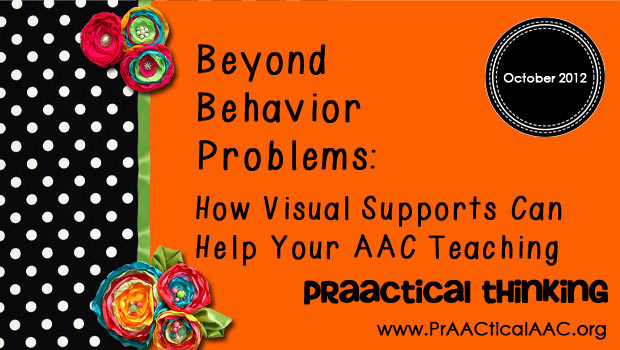
Visual supports are not just for people with behavioral challenges. In this post, we share some ideas of using visual schedules and other supports to enhance comprehension and language learning. Let’s look put this into a clinical context. Marvin is a high school student with intellectual disabilities and cerebral palsy who is learning to use a high tech SGD. He is a personable young man who engages easily and comes to each session with a ‘ready to learn’ mindset. Most of Marvin’s goals revolve on learning to build sentences using core words. Although he has very limited literacy skills, he really, really wants to learn word prediction. This presented a bit of a dilemma, as I typically don’t begin to teach word prediction until spelling skills are approaching the third grade level. Marvin has some terrific splinter skills but his overall spelling skills are probably around the mid-first grade level.... [Read More...]
September 2, 2012
by Robin Parker -
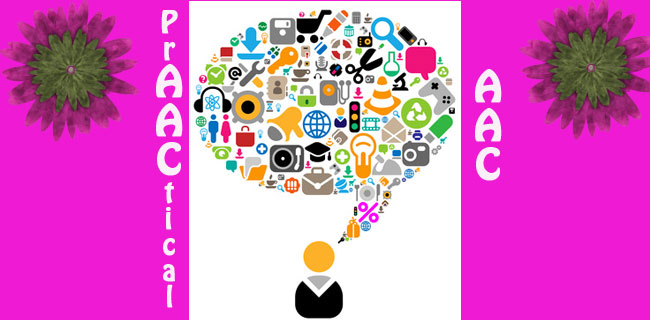
We have recently been surprised (ok, shocked) by the absence of communication supports in educational settings that are supposed to be supporting learners with significant communication challenges. To be even more specific and blunt, the students do not have functional spoken speech. They can’t speak to let you know: what they need, what they don’t need or want, how they feel, what they see, what interests them, what questions they have, what they like and don’t like, when they really reallywant something, etc., etc. etc. And, trust us, they do need to say all of these things. If you work with anyone who does not use spoken speech and we mean ANYONE, they deserve the basic right to communicate with you. Our PrAACtical AAC Absolute A’s: AAC displays need to be accessible ALLOVER. There is no special ‘communication time.’ Communication teaching is ALL the time in authentic situations.... [Read More...]
August 1, 2012
by Carole Zangari -
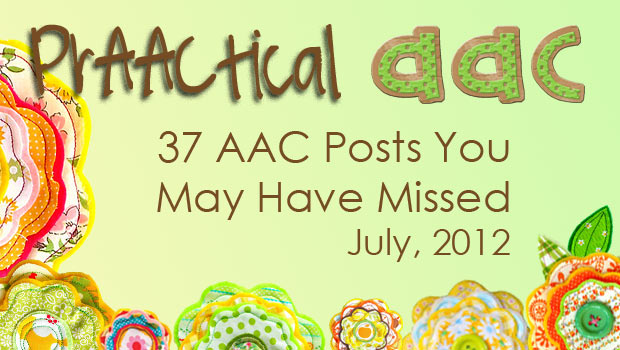
Biennial Conference: ISAAC 2012 PrAACtically There: ISAAC 2012 Day 1 at ISAAC 2012: What You Should Know About AAC’s Expanding Role in Health Care ISAAC 2012, Day 2: AAC Goes to Preschool ISAAC 2012, Day 3: Let the Games Begin ISAAC 2012, Day 4 – The Fives 5+5 Commandments for Speech Output Communication 5 Under-Used Strategies in AAC 5 Online Notebooks Full of AAC 5 Adapted Play Resources for Children with Motor Impairment – PrAACtical Thinking 92 Free or Lite Versions of AAC Apps PrAACtical Alert: Free AAC Evaluation App This Week Visualize 9 Nice Things to Say to Students who AAC PrAACtical Thoughts About Challenging Behavior PrAACtical Resource: Searching for AAC Devices with SpeechBubble AAC Assessment Round-Up 5 Ways to Use Rating Scales to Enhance Communication with AAC PrAACtical Alert: The World’s AAC Conference Comes to You (Well, a little bit of it) Power of the Visual Planner: 20... [Read More...]
July 28, 2012
by Robin Parker -
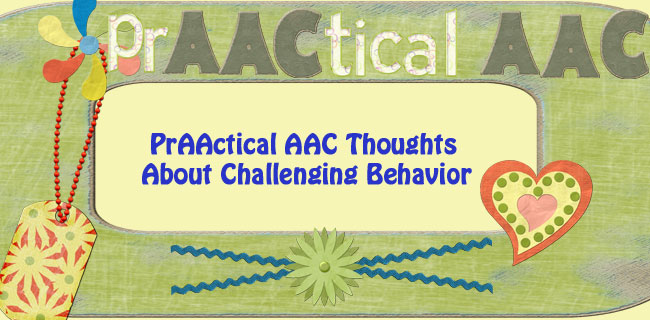
Some PrAACtical AAC thoughts about challenging behavior: I wonder if it is ok to say that we love seeing challenging behavior during speech-language therapy sessions or observations. Well, I said it, both of us do, because if we really ‘listen’ then we can figure out what to teach that will really help our students. We tend to prioritize our goals into High Priority and General Priority. Challenging behavior and the communication message behind it, definitely falls into high priority. This is because challenging behavior in students limits experiences, limits interaction, and overall limits opportunities for people to get to know you. Consider Challenging Behavior through Communication Glasses Is it really Challenging Behavior? behavior that is or can be destructive or hurtful. Examples include but are not limited to: hitting, biting, spitting, throwing, pounding, etc. (Note: we are not talking about poor eye contact or poor attention to task or even laughing... [Read More...]
July 20, 2012
by Robin Parker -
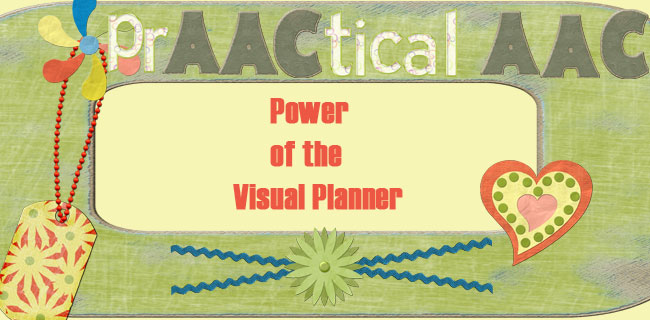
We need to continue to talk about scheduling…..especially as we talk about tools for positive behavioral supports. We know that having monthly, daily, and mini-schedules make us ALL feel more competent and calm. We have written a lot about visual schedules and visual schedule resources because we have seen schedules reduce or eliminate so many behavior challenges. They have helped with transitions, wandering away during activities, activity completion, asking repetitive ‘‘when are we going ________ questions, and with meltdowns during a less preferred activity. We also continue to write about schedules because there are still myths suggesting schedules might hinder independence when exactly the opposite is true. We personally continue to use a combination of no-tech to high-tech visual schedules, but we are loving mobile schedules especially during the summer when we are traveling and moving around from place to place even more frequently than usual. We gathered together... [Read More...]
July 9, 2012
by Carole Zangari -
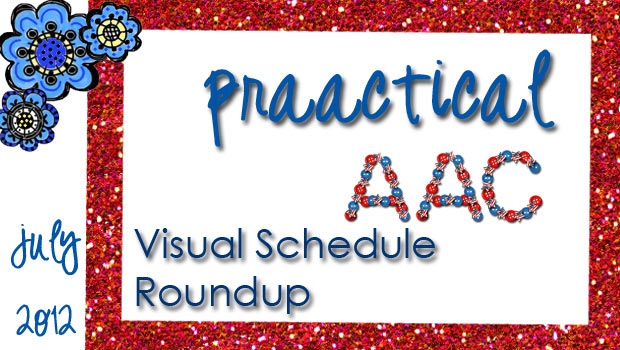
Summer is not the season we typically connect with routine, predictability, and structure. Nonetheless, if strategy really works to make someone’s life better, we try to use it whenever possible. Visual schedules work. They REALLY work. So whether you’re using them this summer or just preparing for the fall, we hope you enjoy this round-up of our past posts on Visual Schedules. – Riddle Me This (clinical rationale) Tech it Up’- 5 Visual Schedule Apps (tools) Visual Strategies 411 (implementation) PrAACtical Mini Schedules (implementation) Ideas for Teaching the Use of Visual Schedules (implementation) Object Schedules (video) Strategy of the Month: Types of Visual Schedules (implementation) Visual Schedules in Action (video) Building Complex Schedules (video) Schedule Changes (Video) AAC at Home: Visual Schedules and Supports Schedules and Choices (implementation) Visual Schedules & Inclusion (video) A Myth About Visual Schedule Lives On (implementation) Visual Schedule Wrap-Up (implementation + resource list) –









